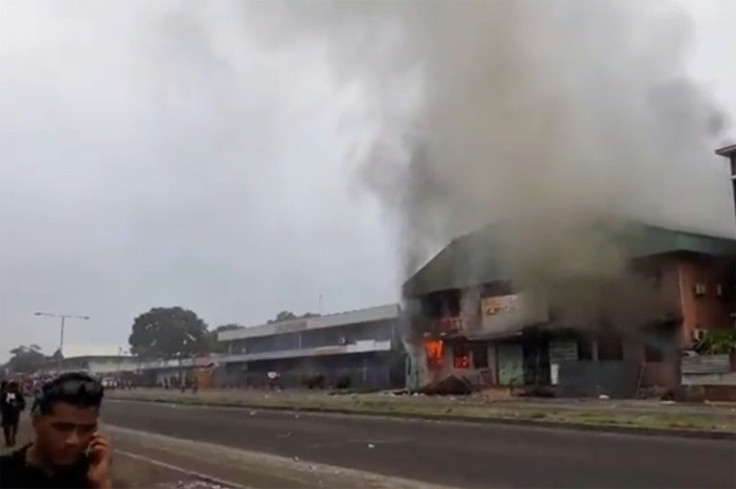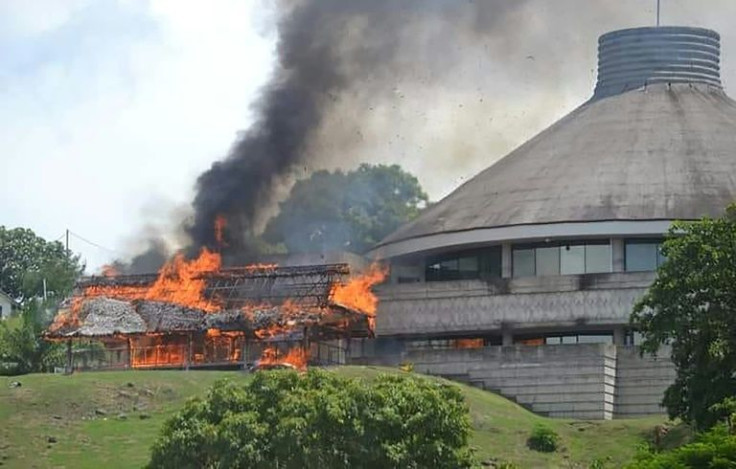Solomons Capital Imposes Curfew After Three Days Of Riots
A night-time curfew entered into force in the Solomon Islands' restive capital Honiara Friday, after a third day of violence that saw the prime minister's home come under attack and swathes of the city reduced to smouldering ruins.
Police fired warning shots and tear gas to scatter rioters who marched on the house of embattled leader Manasseh Sogavare in the east of the usually sleepy seaside capital.
The mob set fire to at least one nearby building before being driven back towards the city centre, AFP reporters witnessed.

Later, freshly arrived Australian police and soldiers moved to restore order, protecting critical infrastructure and providing a highly visible and heavily armed presence on the streets.
As rain fell in the early evening, local authorities moved to stamp out the embers of violence, declaring a night-time curfew in Honiara that will remain in force "until revoked".
Mobs had ignored an earlier 36-hour lockdown, with thousands of people -- some brandishing axes and knives -- roaming through the city's Chinatown, Point Cruz and business districts, according to AFP correspondents on the scene.

The explosion of violence is partly a result of frustrations with Sogavare's government and chronic unemployment -- made worse by a two-year-old pandemic.
"Most people are barely getting one meal a day, there are no tourists and very little economic stimulus," Douglas Kelson, chief officer at St John Ambulance Service, told AFP.
"People do things they normally wouldn't when they are hungry," Kelson said, though he had seen very few injuries.
After three days of mayhem, large areas of the capital were charred by the flames even if the rioters ignited fewer blazes than on previous days.

The scorched-black shells of buildings lined one fire-scarred street and three incinerated trucks were left stranded in the road as young men walked past.
"We are living in fear," resident Josephine Teakeni told AFP.
"At the moment it is very hard... children will be missing out from schools, lots of mothers will be jobless."

Solomon Islands Red Cross secretary general Clement Manuri said Australian police had helped to disperse rioters armed with rocks outside his office.
Many of those in the streets lived in informal settlements near Chinatown and had been drinking alcohol, Manuri said.
In Chinatown itself, a large warehouse was set alight Friday, causing an explosion that sent scores of people fleeing from the scene in panic.
A tobacco warehouse was also torched as smoke from previous days' fires cast parts of the devastated city of 80,000 people in an acrid haze.
The overrun Royal Solomon Islands Police Force said they had made just two arrests, despite two police stations being among the many buildings burned.
The roughly 100 Australian peacekeepers arrived overnight, just hours after Sogavare begged neighbours for urgent help.
In a letter obtained by AFP, Sogavare told his Papua New Guinea counterpart James Marape that "certain elements" had "attempted to overthrow a democratically elected government" and called for peacekeepers to be sent for a "period of three to four weeks".
Papua New Guinea agreed to send 34 peacekeepers to help staunch the violence.
In an address to the nation Sogavare told citizens the Solomons had been "brought to its knees" by the rioting, but vowed to resist calls for his resignation.
The pro-Beijing leader claimed foreign powers opposed to his 2019 decision to switch the Solomons' diplomatic allegiance from Taiwan to China were behind the disturbances.
Experts say the crisis has also been fuelled by long-standing animosity between residents of the most populous island Malaita and the central government based on the island of Guadalcanal.
Malaita residents have long complained that their island is neglected by the central government, and divisions intensified when Sogavare recognised Beijing in 2019.
China's government on Friday condemned the violence and vowed to "safeguard the safety and legitimate rights and interests of Chinese citizens and institutions".
© Copyright AFP 2024. All rights reserved.





















